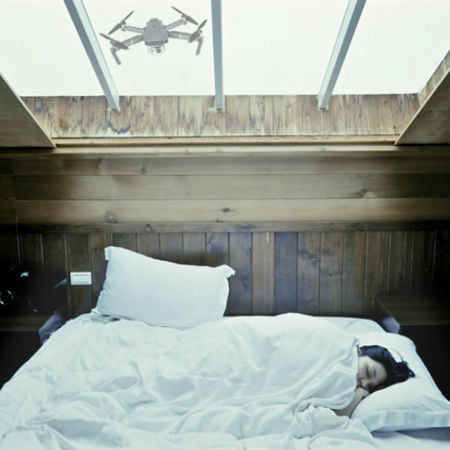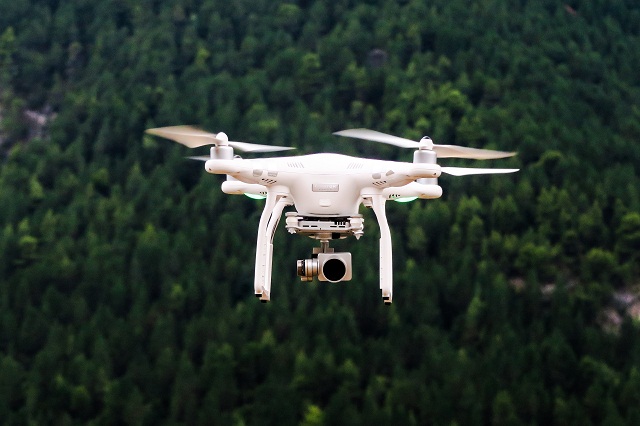
The Obama administration has put together a panel consisting of privacy experts and technological companies to give out rules concerning drone flying without invading the privacy of others.
The guidelines are voluntary and are not enforced on anyone, but some stakeholders involved hope that some very strict regulations would be removed from the guidelines. They fear that these strict guidelines would prevent the growth of the drone industry.
Scroll down for video

Christoffer Engström
Media organizations are exempted from following these guidelines on free-press grounds.
Supporters and lovers of drones have advocated for the improved use of drones and have listed the many ways drones could be used by the general public. They could be used to deliver goods to remote areas, they could be used for video coverage in areas where conventional cameras cannot be used, and they could also be used to inspect downed power lines. Technology giants Google and Amazon want to start using drones to make deliveries.
However, the ability of drones to carry cameras and sensors coupled with their small sizes and their abilities to go anywhere has made many fear that drones could be used to violate the privacy of people.
The drone operators privacy advice released by the Commerce Department’s National Telecommunications and Information Administration was supported by many drone makers, Amazon, technology companies and retailers, and privacy advocates. The suggestions were aimed at both commercial and private users of drones.
Drone Operators Privacy Advice
Information gathered from drones should not be used for decisions about credit, eligibility for healthcare, or employment.
Information from drones shouldn’t be held longer than reasonably necessary. Though exceptions can be made for issues like safety purposes, legal reasons, or with permission from the person being watched.
Personal information gotten from drones should not be used for marketing purposes without the consent of the individual.
Drones shouldn’t be flown over a private property without the consent of the owner.
People in places where drones are to be flown should be alerted, and the purpose of flying the drone should be made known.
Drones shouldn’t be used to stalk or follow a person continuously. Drones shouldn’t be flown in areas where explicit privacy is needed unless there is a pressing or urgent need.

Powie
According to figures from the Federal Aviation Administration (FAA), there are about 5,600 commercial drones registered, and about 450,000 casual drone users have registered at least one drone.
A corporate group called the Consumer Technology Association, whose members include Microsoft, Apple and Google, has said that drone operators privacy advice and guidelines are a balance between privacy and innovation.
The group’s director of regulatory affairs, Alex Reynolds, said that more “prescriptive rules” would threaten the benefits offered by drones, from delivering disaster relief to helping agriculture and infrastructure maintenance.
The Center for Democracy and Technology, a civil liberties group, said it hoped big companies and hobbyists alike would follow the guidelines.
“We’re concerned about the widespread use of drones for surveillance without any rules,” said Chris Calabrese, the group’s vice president of policy. He said the group got all the important protections it wanted in the guidelines, including protection against persistent surveillance even in public places and use of drone-gathered data in employment and marketing.
Media agencies were also present at the discussions and were able to gain an exemption, which allowed them to use drones the same way they use helicopters and planes to record data in public spaces. They were told to ensure that ethical policies and federal and state laws were followed.
Joel Roberson, an attorney who represented the news groups, said that the outcome “will ensure that news-reporting organizations have a First Amendment right to gather the news through drones in the national airspace.”
There were some, though, who refused to agree to these guidelines.

Jason Blackeye
Chinese drone maker DJI and camera maker GoPro, who makes most of the cameras on drones, refused to sign the guidelines.
Kara Calvert, a spokeswoman for the companies, said there are no such drone operators privacy advice and guidelines for security cameras or camera-toting people on ladders or rooftops. Drone users shouldn’t face tougher rules, she said.
The American Civil Liberties Union does not want drone owners to be able to ignore the guidelines under any circumstance. “What does that mean?” said Jay Stanley, a privacy analyst with ACLU. “That kind of weasel language runs throughout the document.”
The FAA would soon issue final regulations regarding the use of drones. These regulations would focus majorly on privacy and not safety though.
In 2015, Pres. Barack Obama ordered the Commerce Department’s National Telecommunications and Information Administration to help in the development of best practices for privacy, safety, and other issues pertaining to drone use.
Watch the video below